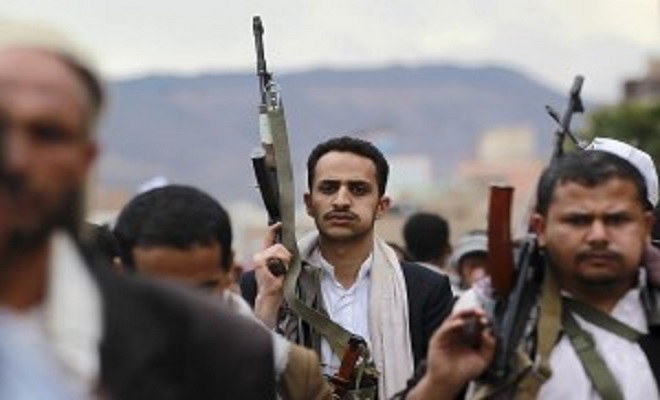 NEO.org
NEO.org
WW3
Yemen: Saudi Arabia has Launched a War Against Iran
byNeo.org:
On March 26 the forces of a hastily formed coalition composed of Saudi Arabia and the GCC countries have launched a military operation against Yemen code named “Decisive Storm.” The stated purpose of this operation was the restoration of “lawful authority”, namely Abd Rabbuh Mansur Hadi who had previously resigned from his position as Yemeni president. The authority in question was quick to flee the town of Aden by boat, under the heavy protection of Saudi special forces. Another goal of this operation is the dislodging of the Houthis from Sana’a and the complete disarmament of their forces. While the ground invasion of Yemen has yet to be started (Saudi Arabia has accumulated a total of 150 thousand soldiers on the Yemeni border), coalition aircraft continue to carry out a systematic bombing of command posts and positions of the Houthis, along with civilian infrastructure. It was reported that the international airports of Sana’a and Aden came under heavy fire. The coalition is using more than 180 combat planes, 100 of them are flying under the KSA flag, while another 30 were provided by the UAE. To justify this aggression Riyadh has started condemning Iran of illegal support of the Houthis, along with its alleged attempts to destabilize the situation in the Arab world, along with Shia expansionism in Iraq, Syria, Lebanon and the Gulf countries. It’s curious that Saudi Arabia informed US authorities only an hour before the actual bombing, which is a rather unprecedented way to launch aggression for a US ally. Naturally, questions are being asked – why has the Arab aggression against Yemen started so abruptly and unexpectedly? After all, the situation has evolved according to the predictions of international experts.
It would instructive to explain this strange behavior of the Al Saud family. The final round of negotiations regarding the Iranian nuclear program started on March 28 in Switzerland, therefore the final agreement must be within reach. Should the sanctions against Iran be lifted completely, a redistribution of strategic balance across the Middle East will be quick to follow. Washington would only accelerate the normalization of its relations with Iran after this step. After all, Iran’s reintegration into the international community – is also a part of the deal on the Iranian nuclear program. That is what Riyadh fears the most since Saudi Arabia is in no position to lose its status as the main US ally in the region. And Tehran stands to challenge this position, since even Washington has grown tired of medieval barbarity and conservatism in the KSA. It has long been clear to everybody that the Islamic Republic of Iran will obtain nuclear weapons one way or another, there’s nothing to be done about it. After all, India and Pakistan have created such weapons, yet no nuclear war followed that fact. Of course, there’s an important factor in the Iranian game that is called Israel. And Benjamin Netanyahu, while visiting the United States did whatever he could to prevent a possible agreement with Iran. But it worked out, since Barack Obama chose to display resilience, while the US has tried to delay for as long as possible Iran’s obtainment of nuclear weapons, to say, a year or two from now. The main objective for Washington here is to come to an agreement on the Iranian nuclear program, which would be interpreted as Teheran’s willingness to abandon its plans to build a nuclear bomb. This would allow the US to justify the withdrawal of sanctions against Iran in the eyes of international community. After all, the negotiations on the Iranian nuclear program have de facto become the negotiations on the roadmap of normalization of US-Iranian relations and the return of the West to Iran. Moscow, however, has finally realized that by supporting this position on the Iranian nuclear program it is only pushing Tehran closer to Washington.
In these circumstances, Saudi Arabia went all in on in the invasion of Yemen. To make at the very least an attempt at complicating the process of normalization of US-Iranian relations. The White house was forced to declare the support of the fight against the Houthis along with its willingness to help the Arab coalition by providing intelligence reports, but at the same time it didn’t say a word against Tehran. Iran’s reaction was swift – the complications in the negotiations on the nuclear program emerged out of the blue. Moreover, Tehran denied the reports made by the international media that an agreement could be reached within hours. It turned out that Riyadh has beaten Washington by this unexpected move. Yet, the US Secretary of State John Kerry was quick to cancel his schedule to be able to stay in Lausanne. By April 2 the parties involved have achieved considerable progress in the negotiations on the Iranian nuclear program, and now it’s only a matter of technical details before the final agreement is signed. And this time around it’s the United States of America that is making concessions.
Unfortunately, as it was the case with the “color” revolutions, Russian diplomacy has once again made a number of mistakes by failing to recognize the real intentions of a number of Arab countries. Moscow was eager to establish economic bonds and military cooperation with such states like Saudi Arabia and Qatar, but it has failed in its quest.
Russia has virtually gained nothing from a high-level dialogue with the GCC countries that was initiated by Moscow in 2011. No real economic benefits were gained, but on numerous forums Russian delegations were compelled to sit down and listen to a stream of rude comments about Russia’s position on Syria that were made by the Persian Gulf representatives. On top of that, at the Arab League summit in Sharm el-Sheikh on March 28, Russia received a slap in the face from Saudi Arabia, when in response to a message sent by President Vladimir Putin to the participants of the summit, Saudi Foreign Minister Saud Al Faisal brazenly declared that Russia should stop its negative impact on conflicts in the region.
Another mistake of Russian diplomacy – is a slightly inadequate rapprochement with Egypt. Vladimir Putin’s visit to Cairo in February was arranged with with great pomp. The presidents have signed a long list of bilateral agreements, ranging from the mutual fight against terrorism to the cooperation on nuclear power cooperation, and the supply of Russian weapons to Egypt. And now Egypt has taken sides with the GCC in the war against Yemen. Apparently, some Russia analysts, while promoting special relationships with Cairo, have forgotten that Egypt has been always been in the US sphere of interests, both in political, military, and economic terms, at the same time it can hardly survive without the billions of dollars in aid provided by Saudi Arabia. It seems that Egypt’s President Abdel Fattah el-Sisi was eager to play the Russian card in order to apply pressure on Washington. But the visit paid by Vladimir Putin to Cairo has seriously irritated the US and KSA. The support money hasn’t been transferred by Egypt’s main sponsor ever since. President Abdel Fattah el-Sisi made Riyadh so angry that he had to shout about the support for the Saudi operation louder than anybody else, while expressing his readiness to send Egyptian troops and warships to the war zone. And he will more likely than not be replaced by a more loyal figure. Apparently, it’s no coincidence that at the Arab League summit Saud Al Faisal publicly criticized the Egyptian leader, since he delivered a message sent by Vladimir Putin.
Finally, one cannot disregard the mistakes committed by Russia diplomacy in the situation surrounding Yemen. It is not clear why Moscow from the beginning followed in the US and the GCC policies on Yemen when they decided to overthrow a longtime partner of Moscow – President Ali Abdullah Saleh back in 2012, it’s not clear either why Moscow started supporting a pro-US president Abd Rabbuh Mansur Hadi, when his appointment was clearly a step against the Houthis. Additionally, Moscow approved all of the UN Security Council decisions on Yemen, that were clearly designed to favor pro-Saudi and pro-US special interests in Yemen. While the Arab aggression against Yemen hasn’t been predicted by Russia’ analysts, otherwise hundreds of Russian citizens, including the ambassador, would have been waiting for the gracious permission of the Saudi authorities to be evacuated from Sana’a in a narrow window between the bombing raids. The only logical question to ask is did Moscow know of the impending military coalition operation, since the Saudi officials announced their intentions two days before the bombing started? It’s a marvel that the Consul General was evacuated from Aden just in time, saved by a Russian military cruiser. However, in doing so he “forgot” there where dozens of Russian citizens still residing there. As a result, late in the evening on April 1 Saudi bombs hit the grounds of the Consulate General, which resulted in the facility being looted by marauders.
These steps, that were greatly beneficial for the West and the GCC are hard to explain. Especially if one is to consider the fact that Washington and Riyadh brought oil prices together to cause a considerable amount of damage to the Russian economy, while the West had previously imposed sanctions against Russia over the situation in Ukraine.
It is clear that air strikes against Yemen will lead the coalition nowhere. The Houthis are suffering losses, for sure, but the main victim of these strikes is the civilian population. It is also clear that without a large-scale ground operation the Houthis will not fall. They have already entered the town of Aden, depriving the former President Abd Rabbuh Mansur Hadi the last features of legitimacy. Now he’s unable, even formally, to declare himself a leader of Yemen, supported by the loud cries of the GCC leaders. As of now he is nothing more than a former president in exile.
It’s too risky for Egypt to send troops to Yemen: it will only strengthen the Islamist sentiment in the country and weaken the already shaky position of Abdel Fattah el-Sisi. As for Saudi Arabia, it has amassed an army of 150 thousand soldiers on its borders. But once they leave Saudi Arabia for Yemen, the situation can easily spiral out of control, since the kingdom is undergoing a difficult change provoked by the new king. After his accession to the throne, king Salman bin Abdulaziz Al Saud started the reshuffling of senior members of the government, replacing a lot of figures in the army and security services. In addition, the Houthis are masters of guerrilla warfare while Saudis don’t make good soldiers under even conventional conditions, therefore the invading force will have to sustain enormous losses that will only undermine the stability of the royal regime. Should the Shia followers of the Eastern Province of KSA and Bahrain’s Shia population revolt in solidarity with the Houthis , things will turn from bad to worse. Yet, Saudi Arabia is in no position to summon Pakistani troops for help. After all – Pakistan is not an Arab country, and it doesn’t have a mandate from the United Nations to act legitimately. One thing is clear – there’s no winning a war against the Houthis with brute force alone, it can only plunge Yemen into years and years of war that would fuel the Sunni-Shiite conflict even further.
Riyadh has started yet another extremely dangerous conflict right on its own borders, while acting like a bull in a china shop. It is unlikely that Riyadh will come out on top of this, but this situation will be extremely beneficial for Iran, strengthening its position in the region by peaceful means alone. The creation of a Shia arc has now become a reality.












